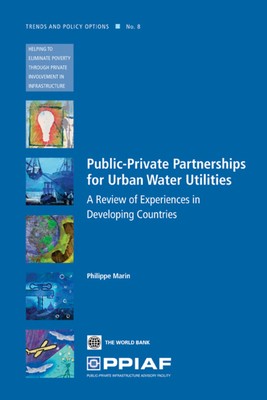
- We will send in 10–14 business days.
- Author: Philippe Marin
- Publisher: World Bank Publications
- ISBN-10: 0821379569
- ISBN-13: 9780821379561
- Format: 15 x 22.6 x 1.5 cm, softcover
- Language: English
- SAVE -10% with code: EXTRA
Public Private Partnerships for Urban Water Utilities (e-book) (used book) | bookbook.eu
Reviews
Description
"'Public-Private Partnerships for Urban Water Utilities: A Review of Experiences in Developing Countries' analyzes the market growth of Public-Private Partnerships (PPPs) in the developing world since 1990, and the performance of more than 65 large water PPP projects-representing more than 100 million people-for access, service quality, operational efficiency, and tariff levels. Although a relatively small portion of the water utilities in the developing world are operated under PPPs (about 7 percent in 2007), the urban population served by private water operators has grown every year since 1990. Despite many difficulties encountered by PPP projects and a few contract terminations, a large majority of contracts awarded since 1990 are still in place. The track record for improving service and efficiency reaffirms the value of PPPs to help turn around poorly performing water utilities, even though the level of private financing did not match initial expectations. Over time, a more realistic market has developed, the number of private investors from developing countries has grown, and contract designs have become more pragmatic concerning risk allocations between partners. The water sector has many features that set it apart from other infrastructure sectors. This book suggests the need for careful consideration of those specificities to successfully involve private operators. Although concessions with private financing have worked in a few places, contractual arrangements that combine private operation with public financing appear to be the most sustainable option in many countries. Policy makers, stakeholders, and donors need to remain heavily engaged in the water sector, especially in the poorest countries and during a global financial crisis. This book contributes to a better understanding of the various options to tackle the many challenges of providing water and sanitation services to urban populations in the developing world."
EXTRA 10 % discount with code: EXTRA
The promotion ends in 20d.17:14:02
The discount code is valid when purchasing from 10 €. Discounts do not stack.
- Author: Philippe Marin
- Publisher: World Bank Publications
- ISBN-10: 0821379569
- ISBN-13: 9780821379561
- Format: 15 x 22.6 x 1.5 cm, softcover
- Language: English English
"'Public-Private Partnerships for Urban Water Utilities: A Review of Experiences in Developing Countries' analyzes the market growth of Public-Private Partnerships (PPPs) in the developing world since 1990, and the performance of more than 65 large water PPP projects-representing more than 100 million people-for access, service quality, operational efficiency, and tariff levels. Although a relatively small portion of the water utilities in the developing world are operated under PPPs (about 7 percent in 2007), the urban population served by private water operators has grown every year since 1990. Despite many difficulties encountered by PPP projects and a few contract terminations, a large majority of contracts awarded since 1990 are still in place. The track record for improving service and efficiency reaffirms the value of PPPs to help turn around poorly performing water utilities, even though the level of private financing did not match initial expectations. Over time, a more realistic market has developed, the number of private investors from developing countries has grown, and contract designs have become more pragmatic concerning risk allocations between partners. The water sector has many features that set it apart from other infrastructure sectors. This book suggests the need for careful consideration of those specificities to successfully involve private operators. Although concessions with private financing have worked in a few places, contractual arrangements that combine private operation with public financing appear to be the most sustainable option in many countries. Policy makers, stakeholders, and donors need to remain heavily engaged in the water sector, especially in the poorest countries and during a global financial crisis. This book contributes to a better understanding of the various options to tackle the many challenges of providing water and sanitation services to urban populations in the developing world."


Reviews